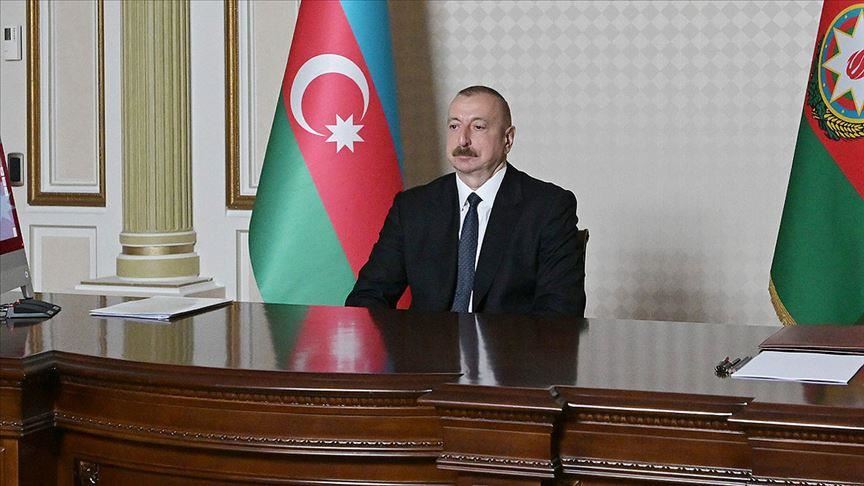Azerbaijan: Turkey should co-chair Minsk Group
Power of Armenian diaspora in current co-chair countries unfair amid Upper Karabakh tension, argues Azerbaijani president

ANKARA
Azerbaijan's president on Monday reported his country's call for Turkey to be included in the process to resolve Baku's ongoing conflict with Armenia.
In an interview with Haber Global TV, Ilham Aliyev commented on recent developments in the Upper Karabakh region, a recent humanitarian cease-fire between Azerbaijan and Armenia and Turkey's possible inclusion in the solution process between the two countries.
Aliyev argued that some members of the Minsk Group under the Organization for Security and Co-operation in Europe (OSCE) were geographically too far away from the region and that the influence of the Armenian diaspora in the group's co-chairs -- namely Russia, the US and France -- was simply not fair, adding that decades-long talks had not born any fruit for Baku.
Noting that Turkey was already a member of the Minsk Group and stood as an independent country capable of contributing to conflict-resolution across the region despite some Western countries' reluctance to recognize this, he cited Ankara's role in Syria and Libya as proof of his argument that Ankara could better contribute to resolving the issue if it became a co-chair of the Minsk Group.
Armenia: 'Fascist' state
Aliyev asserted that the Armenian military violated Saturday's humanitarian cease-fire in the occupied region of Upper Karabakh, also known as Nagorno-Karabakh, and that the Azerbaijani army retaliated against these attacks. The cease-fire in Moscow was adopted for sake of humanitarian concerns and did not offer a full resolution of the conflict, he said.
According to the Azerbaijani president, Armenian forces targeted civilian settlements as Ganja -- one of Azerbaijan’s most-populous provinces -- via a missile strike that left civilians dead or wounded.
Armenian attacks on civilians within Azerbaijan's borders revealed Yerevan's true colors, said Aliyev, accusing Armenia of being a state of terror and fascism.
Moreover, disinformation campaigns aimed at harming Azerbaijan's global reputation are doomed to fail as today's sophisticated communication technology reflect what is going on in the region to the rest of the world, he added.
Stressing that the Azerbaijani army seeks to liberate its territories under occupation, Aliyev further noted that the conflict would come to an end if Armenian troops leave the occupied regions.
Upper Karabakh conflict
Relations between the two former Soviet republics have been tense since 1991 when the Armenian military occupied Upper Karabakh.
The fresh clashes began when Armenian forces targeted civilian Azerbaijani settlements and military positions in the region, leading to casualties.
Many world powers, including Russia, France, and the US, have urged a new cease-fire. Turkey, meanwhile, has supported Baku’s right to self-defense and demanded the withdrawal of Armenia’s occupying forces.
Four UN Security Council and two UN General Assembly resolutions, as well as many international organizations, demand the withdrawal of the occupying forces.
The OSCE Minsk Group -- co-chaired by France, Russia, and the US -- was formed in 1992 to find a peaceful solution to the conflict, but to no avail. A cease-fire, however, was agreed to in 1994.
Anadolu Agency website contains only a portion of the news stories offered to subscribers in the AA News Broadcasting System (HAS), and in summarized form. Please contact us for subscription options.







